Business Environment Analysis: Starbucks' FDI in the Belgian Market
VerifiedAdded on 2020/10/05
|12
|3526
|276
Report
AI Summary
This report provides a comprehensive analysis of Starbucks' potential expansion into Belgium through Foreign Direct Investment (FDI). It begins with background information on Starbucks and the business environment in Belgium, emphasizing the country's political stability, economic development, social trends, technological advancements, environmental considerations, and legal frameworks. The report utilizes a PESTEL analysis to evaluate the external factors influencing Starbucks' entry into the Belgian market, considering aspects such as government policies, economic indicators, consumer preferences, technological innovations, environmental regulations, and legal compliance. The analysis highlights both the opportunities and challenges that Starbucks may encounter, including the country's strategic location, skilled workforce, and high purchasing power, alongside potential threats from home coffee machines and evolving consumer behaviors. The report concludes with an assessment of the business scenario, emphasizing the importance of adapting to local market conditions and leveraging the country's favorable investment climate to achieve successful expansion and profitability.
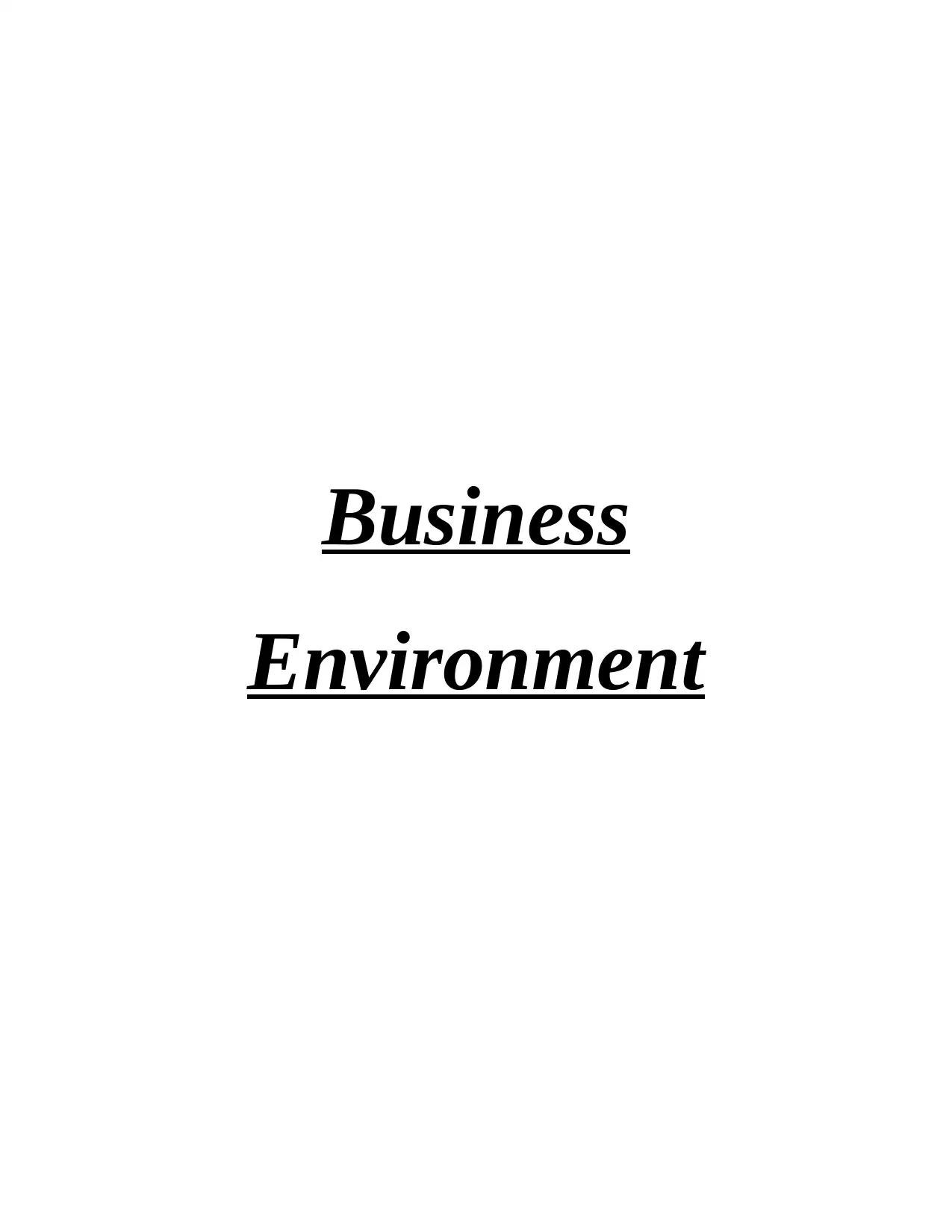
Business
Environment
Environment
Paraphrase This Document
Need a fresh take? Get an instant paraphrase of this document with our AI Paraphraser
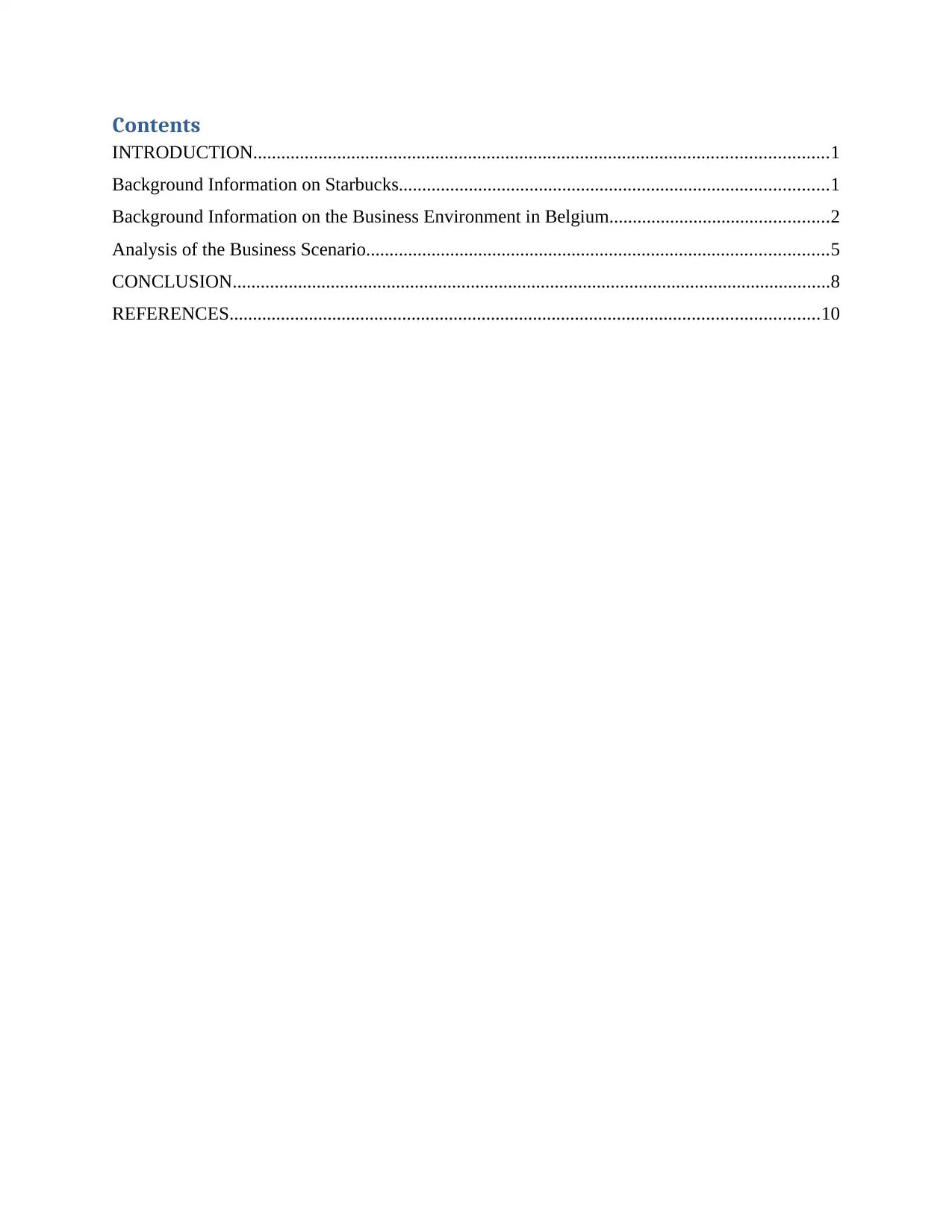
Contents
INTRODUCTION...........................................................................................................................1
Background Information on Starbucks............................................................................................1
Background Information on the Business Environment in Belgium...............................................2
Analysis of the Business Scenario...................................................................................................5
CONCLUSION................................................................................................................................8
REFERENCES..............................................................................................................................10
INTRODUCTION...........................................................................................................................1
Background Information on Starbucks............................................................................................1
Background Information on the Business Environment in Belgium...............................................2
Analysis of the Business Scenario...................................................................................................5
CONCLUSION................................................................................................................................8
REFERENCES..............................................................................................................................10
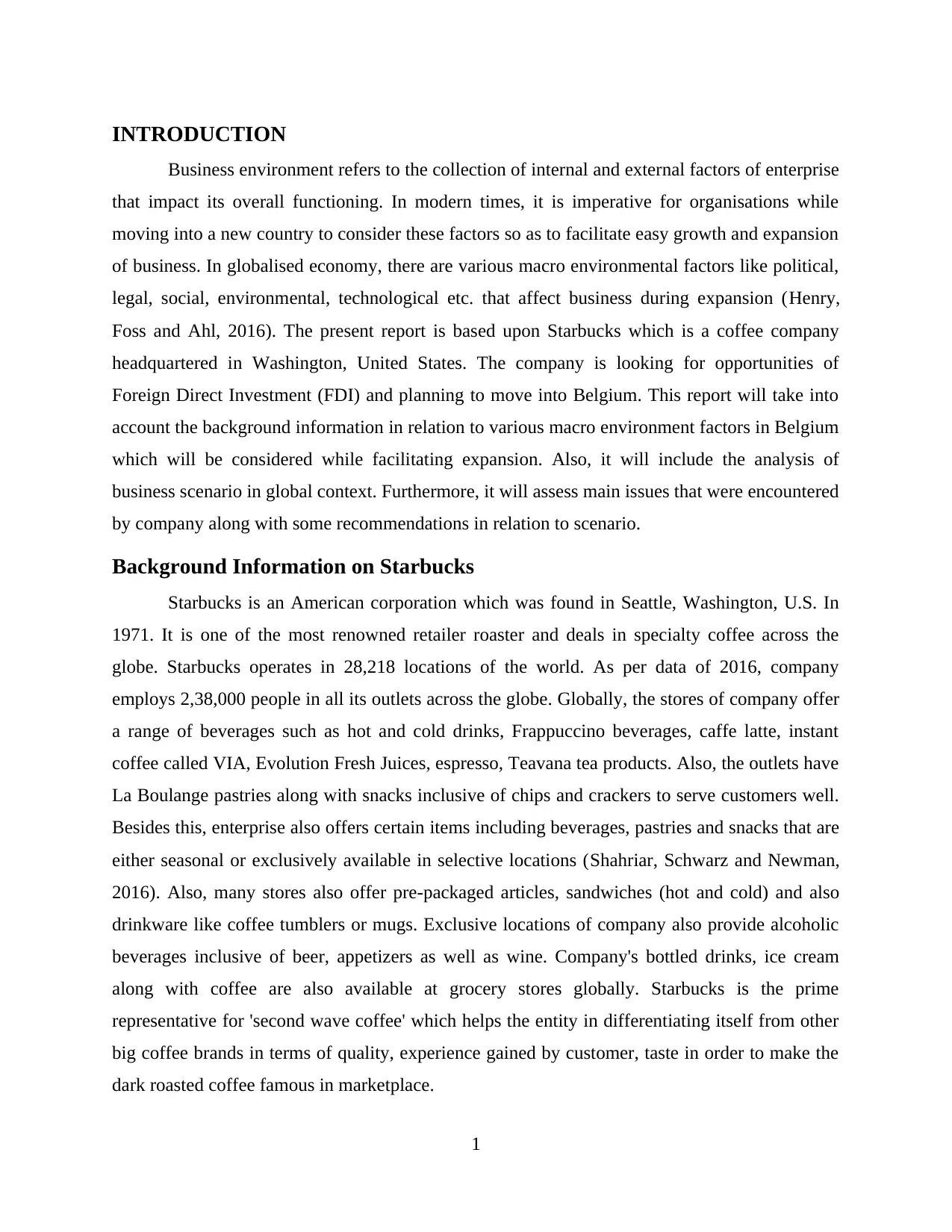
INTRODUCTION
Business environment refers to the collection of internal and external factors of enterprise
that impact its overall functioning. In modern times, it is imperative for organisations while
moving into a new country to consider these factors so as to facilitate easy growth and expansion
of business. In globalised economy, there are various macro environmental factors like political,
legal, social, environmental, technological etc. that affect business during expansion (Henry,
Foss and Ahl, 2016). The present report is based upon Starbucks which is a coffee company
headquartered in Washington, United States. The company is looking for opportunities of
Foreign Direct Investment (FDI) and planning to move into Belgium. This report will take into
account the background information in relation to various macro environment factors in Belgium
which will be considered while facilitating expansion. Also, it will include the analysis of
business scenario in global context. Furthermore, it will assess main issues that were encountered
by company along with some recommendations in relation to scenario.
Background Information on Starbucks
Starbucks is an American corporation which was found in Seattle, Washington, U.S. In
1971. It is one of the most renowned retailer roaster and deals in specialty coffee across the
globe. Starbucks operates in 28,218 locations of the world. As per data of 2016, company
employs 2,38,000 people in all its outlets across the globe. Globally, the stores of company offer
a range of beverages such as hot and cold drinks, Frappuccino beverages, caffe latte, instant
coffee called VIA, Evolution Fresh Juices, espresso, Teavana tea products. Also, the outlets have
La Boulange pastries along with snacks inclusive of chips and crackers to serve customers well.
Besides this, enterprise also offers certain items including beverages, pastries and snacks that are
either seasonal or exclusively available in selective locations (Shahriar, Schwarz and Newman,
2016). Also, many stores also offer pre-packaged articles, sandwiches (hot and cold) and also
drinkware like coffee tumblers or mugs. Exclusive locations of company also provide alcoholic
beverages inclusive of beer, appetizers as well as wine. Company's bottled drinks, ice cream
along with coffee are also available at grocery stores globally. Starbucks is the prime
representative for 'second wave coffee' which helps the entity in differentiating itself from other
big coffee brands in terms of quality, experience gained by customer, taste in order to make the
dark roasted coffee famous in marketplace.
1
Business environment refers to the collection of internal and external factors of enterprise
that impact its overall functioning. In modern times, it is imperative for organisations while
moving into a new country to consider these factors so as to facilitate easy growth and expansion
of business. In globalised economy, there are various macro environmental factors like political,
legal, social, environmental, technological etc. that affect business during expansion (Henry,
Foss and Ahl, 2016). The present report is based upon Starbucks which is a coffee company
headquartered in Washington, United States. The company is looking for opportunities of
Foreign Direct Investment (FDI) and planning to move into Belgium. This report will take into
account the background information in relation to various macro environment factors in Belgium
which will be considered while facilitating expansion. Also, it will include the analysis of
business scenario in global context. Furthermore, it will assess main issues that were encountered
by company along with some recommendations in relation to scenario.
Background Information on Starbucks
Starbucks is an American corporation which was found in Seattle, Washington, U.S. In
1971. It is one of the most renowned retailer roaster and deals in specialty coffee across the
globe. Starbucks operates in 28,218 locations of the world. As per data of 2016, company
employs 2,38,000 people in all its outlets across the globe. Globally, the stores of company offer
a range of beverages such as hot and cold drinks, Frappuccino beverages, caffe latte, instant
coffee called VIA, Evolution Fresh Juices, espresso, Teavana tea products. Also, the outlets have
La Boulange pastries along with snacks inclusive of chips and crackers to serve customers well.
Besides this, enterprise also offers certain items including beverages, pastries and snacks that are
either seasonal or exclusively available in selective locations (Shahriar, Schwarz and Newman,
2016). Also, many stores also offer pre-packaged articles, sandwiches (hot and cold) and also
drinkware like coffee tumblers or mugs. Exclusive locations of company also provide alcoholic
beverages inclusive of beer, appetizers as well as wine. Company's bottled drinks, ice cream
along with coffee are also available at grocery stores globally. Starbucks is the prime
representative for 'second wave coffee' which helps the entity in differentiating itself from other
big coffee brands in terms of quality, experience gained by customer, taste in order to make the
dark roasted coffee famous in marketplace.
1
⊘ This is a preview!⊘
Do you want full access?
Subscribe today to unlock all pages.

Trusted by 1+ million students worldwide
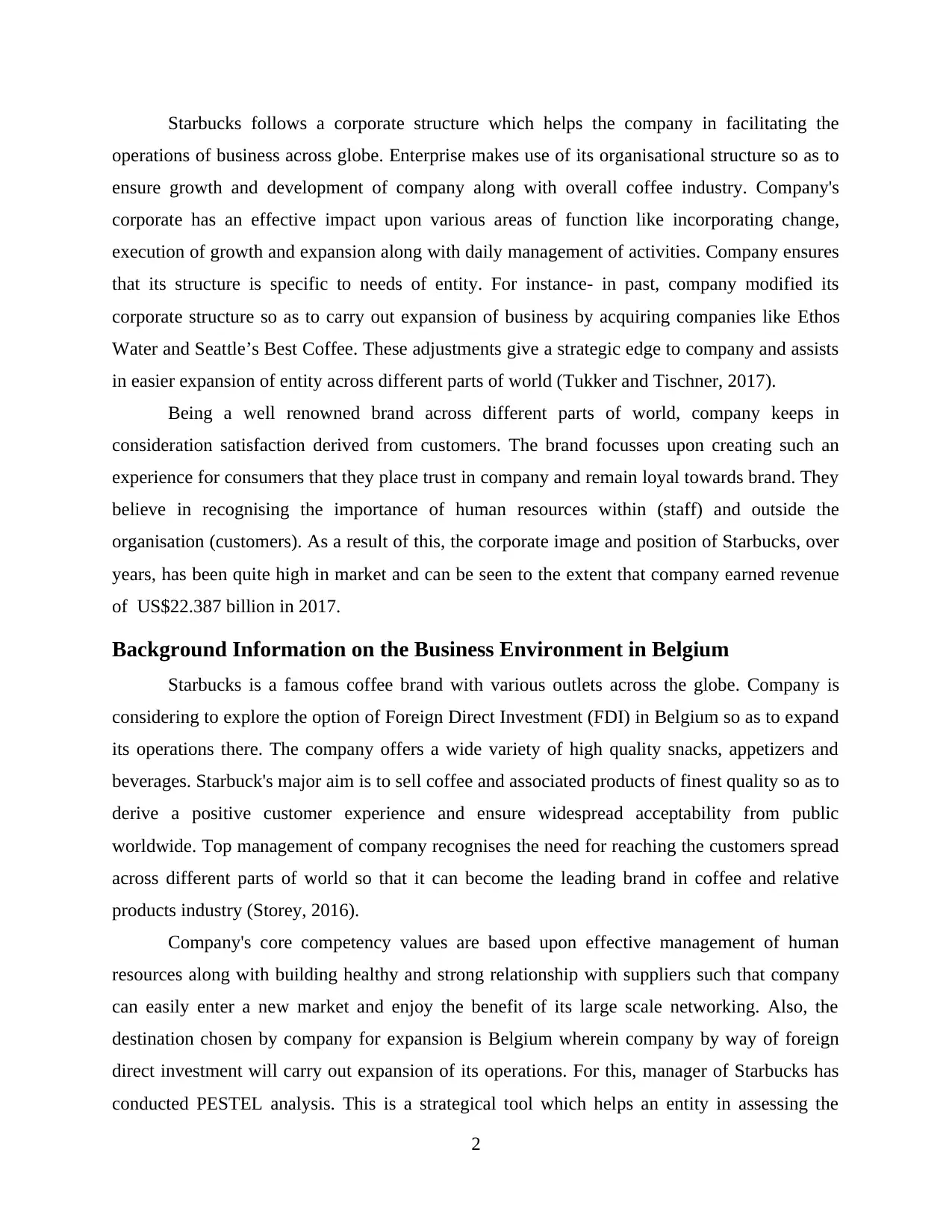
Starbucks follows a corporate structure which helps the company in facilitating the
operations of business across globe. Enterprise makes use of its organisational structure so as to
ensure growth and development of company along with overall coffee industry. Company's
corporate has an effective impact upon various areas of function like incorporating change,
execution of growth and expansion along with daily management of activities. Company ensures
that its structure is specific to needs of entity. For instance- in past, company modified its
corporate structure so as to carry out expansion of business by acquiring companies like Ethos
Water and Seattle’s Best Coffee. These adjustments give a strategic edge to company and assists
in easier expansion of entity across different parts of world (Tukker and Tischner, 2017).
Being a well renowned brand across different parts of world, company keeps in
consideration satisfaction derived from customers. The brand focusses upon creating such an
experience for consumers that they place trust in company and remain loyal towards brand. They
believe in recognising the importance of human resources within (staff) and outside the
organisation (customers). As a result of this, the corporate image and position of Starbucks, over
years, has been quite high in market and can be seen to the extent that company earned revenue
of US$22.387 billion in 2017.
Background Information on the Business Environment in Belgium
Starbucks is a famous coffee brand with various outlets across the globe. Company is
considering to explore the option of Foreign Direct Investment (FDI) in Belgium so as to expand
its operations there. The company offers a wide variety of high quality snacks, appetizers and
beverages. Starbuck's major aim is to sell coffee and associated products of finest quality so as to
derive a positive customer experience and ensure widespread acceptability from public
worldwide. Top management of company recognises the need for reaching the customers spread
across different parts of world so that it can become the leading brand in coffee and relative
products industry (Storey, 2016).
Company's core competency values are based upon effective management of human
resources along with building healthy and strong relationship with suppliers such that company
can easily enter a new market and enjoy the benefit of its large scale networking. Also, the
destination chosen by company for expansion is Belgium wherein company by way of foreign
direct investment will carry out expansion of its operations. For this, manager of Starbucks has
conducted PESTEL analysis. This is a strategical tool which helps an entity in assessing the
2
operations of business across globe. Enterprise makes use of its organisational structure so as to
ensure growth and development of company along with overall coffee industry. Company's
corporate has an effective impact upon various areas of function like incorporating change,
execution of growth and expansion along with daily management of activities. Company ensures
that its structure is specific to needs of entity. For instance- in past, company modified its
corporate structure so as to carry out expansion of business by acquiring companies like Ethos
Water and Seattle’s Best Coffee. These adjustments give a strategic edge to company and assists
in easier expansion of entity across different parts of world (Tukker and Tischner, 2017).
Being a well renowned brand across different parts of world, company keeps in
consideration satisfaction derived from customers. The brand focusses upon creating such an
experience for consumers that they place trust in company and remain loyal towards brand. They
believe in recognising the importance of human resources within (staff) and outside the
organisation (customers). As a result of this, the corporate image and position of Starbucks, over
years, has been quite high in market and can be seen to the extent that company earned revenue
of US$22.387 billion in 2017.
Background Information on the Business Environment in Belgium
Starbucks is a famous coffee brand with various outlets across the globe. Company is
considering to explore the option of Foreign Direct Investment (FDI) in Belgium so as to expand
its operations there. The company offers a wide variety of high quality snacks, appetizers and
beverages. Starbuck's major aim is to sell coffee and associated products of finest quality so as to
derive a positive customer experience and ensure widespread acceptability from public
worldwide. Top management of company recognises the need for reaching the customers spread
across different parts of world so that it can become the leading brand in coffee and relative
products industry (Storey, 2016).
Company's core competency values are based upon effective management of human
resources along with building healthy and strong relationship with suppliers such that company
can easily enter a new market and enjoy the benefit of its large scale networking. Also, the
destination chosen by company for expansion is Belgium wherein company by way of foreign
direct investment will carry out expansion of its operations. For this, manager of Starbucks has
conducted PESTEL analysis. This is a strategical tool which helps an entity in assessing the
2
Paraphrase This Document
Need a fresh take? Get an instant paraphrase of this document with our AI Paraphraser
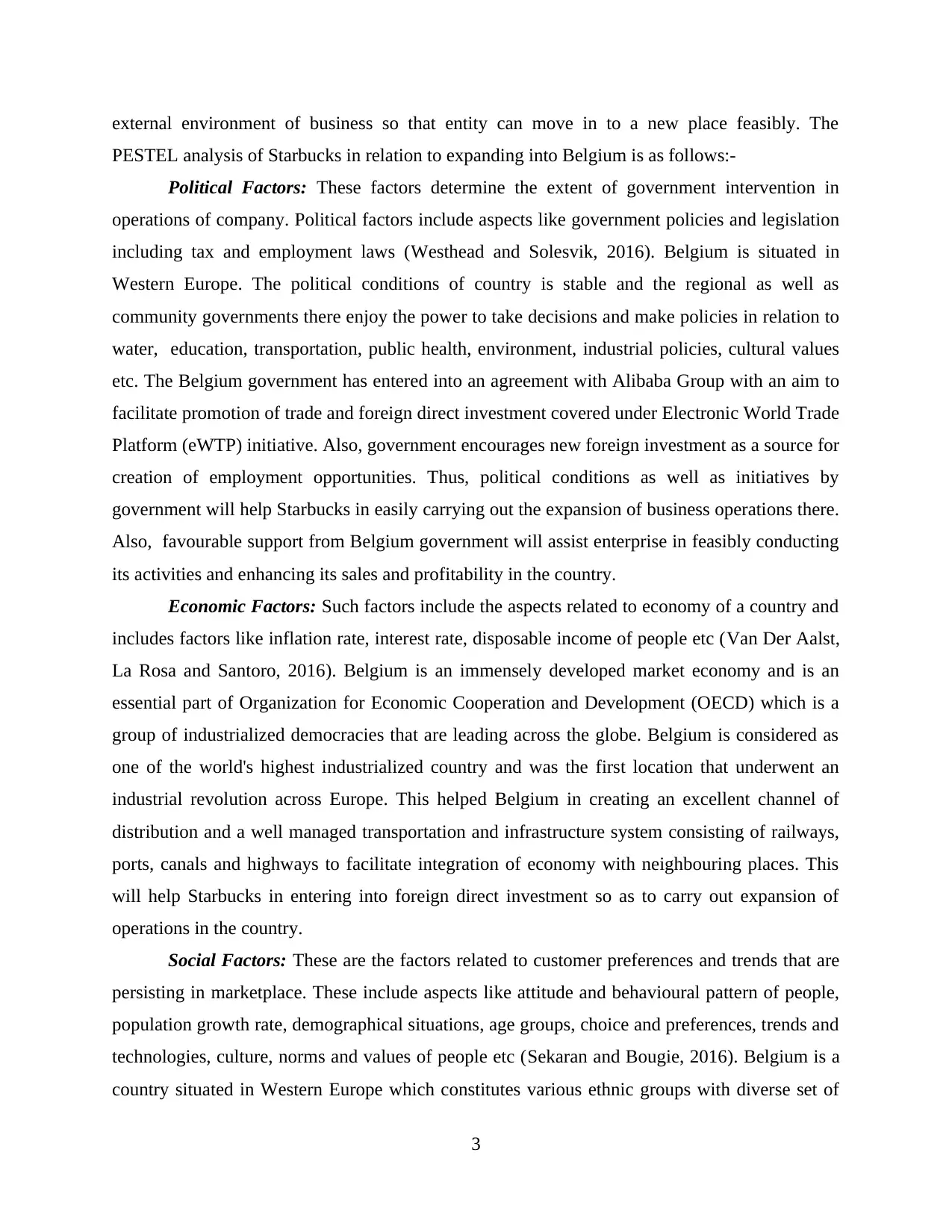
external environment of business so that entity can move in to a new place feasibly. The
PESTEL analysis of Starbucks in relation to expanding into Belgium is as follows:-
Political Factors: These factors determine the extent of government intervention in
operations of company. Political factors include aspects like government policies and legislation
including tax and employment laws (Westhead and Solesvik, 2016). Belgium is situated in
Western Europe. The political conditions of country is stable and the regional as well as
community governments there enjoy the power to take decisions and make policies in relation to
water, education, transportation, public health, environment, industrial policies, cultural values
etc. The Belgium government has entered into an agreement with Alibaba Group with an aim to
facilitate promotion of trade and foreign direct investment covered under Electronic World Trade
Platform (eWTP) initiative. Also, government encourages new foreign investment as a source for
creation of employment opportunities. Thus, political conditions as well as initiatives by
government will help Starbucks in easily carrying out the expansion of business operations there.
Also, favourable support from Belgium government will assist enterprise in feasibly conducting
its activities and enhancing its sales and profitability in the country.
Economic Factors: Such factors include the aspects related to economy of a country and
includes factors like inflation rate, interest rate, disposable income of people etc (Van Der Aalst,
La Rosa and Santoro, 2016). Belgium is an immensely developed market economy and is an
essential part of Organization for Economic Cooperation and Development (OECD) which is a
group of industrialized democracies that are leading across the globe. Belgium is considered as
one of the world's highest industrialized country and was the first location that underwent an
industrial revolution across Europe. This helped Belgium in creating an excellent channel of
distribution and a well managed transportation and infrastructure system consisting of railways,
ports, canals and highways to facilitate integration of economy with neighbouring places. This
will help Starbucks in entering into foreign direct investment so as to carry out expansion of
operations in the country.
Social Factors: These are the factors related to customer preferences and trends that are
persisting in marketplace. These include aspects like attitude and behavioural pattern of people,
population growth rate, demographical situations, age groups, choice and preferences, trends and
technologies, culture, norms and values of people etc (Sekaran and Bougie, 2016). Belgium is a
country situated in Western Europe which constitutes various ethnic groups with diverse set of
3
PESTEL analysis of Starbucks in relation to expanding into Belgium is as follows:-
Political Factors: These factors determine the extent of government intervention in
operations of company. Political factors include aspects like government policies and legislation
including tax and employment laws (Westhead and Solesvik, 2016). Belgium is situated in
Western Europe. The political conditions of country is stable and the regional as well as
community governments there enjoy the power to take decisions and make policies in relation to
water, education, transportation, public health, environment, industrial policies, cultural values
etc. The Belgium government has entered into an agreement with Alibaba Group with an aim to
facilitate promotion of trade and foreign direct investment covered under Electronic World Trade
Platform (eWTP) initiative. Also, government encourages new foreign investment as a source for
creation of employment opportunities. Thus, political conditions as well as initiatives by
government will help Starbucks in easily carrying out the expansion of business operations there.
Also, favourable support from Belgium government will assist enterprise in feasibly conducting
its activities and enhancing its sales and profitability in the country.
Economic Factors: Such factors include the aspects related to economy of a country and
includes factors like inflation rate, interest rate, disposable income of people etc (Van Der Aalst,
La Rosa and Santoro, 2016). Belgium is an immensely developed market economy and is an
essential part of Organization for Economic Cooperation and Development (OECD) which is a
group of industrialized democracies that are leading across the globe. Belgium is considered as
one of the world's highest industrialized country and was the first location that underwent an
industrial revolution across Europe. This helped Belgium in creating an excellent channel of
distribution and a well managed transportation and infrastructure system consisting of railways,
ports, canals and highways to facilitate integration of economy with neighbouring places. This
will help Starbucks in entering into foreign direct investment so as to carry out expansion of
operations in the country.
Social Factors: These are the factors related to customer preferences and trends that are
persisting in marketplace. These include aspects like attitude and behavioural pattern of people,
population growth rate, demographical situations, age groups, choice and preferences, trends and
technologies, culture, norms and values of people etc (Sekaran and Bougie, 2016). Belgium is a
country situated in Western Europe which constitutes various ethnic groups with diverse set of
3
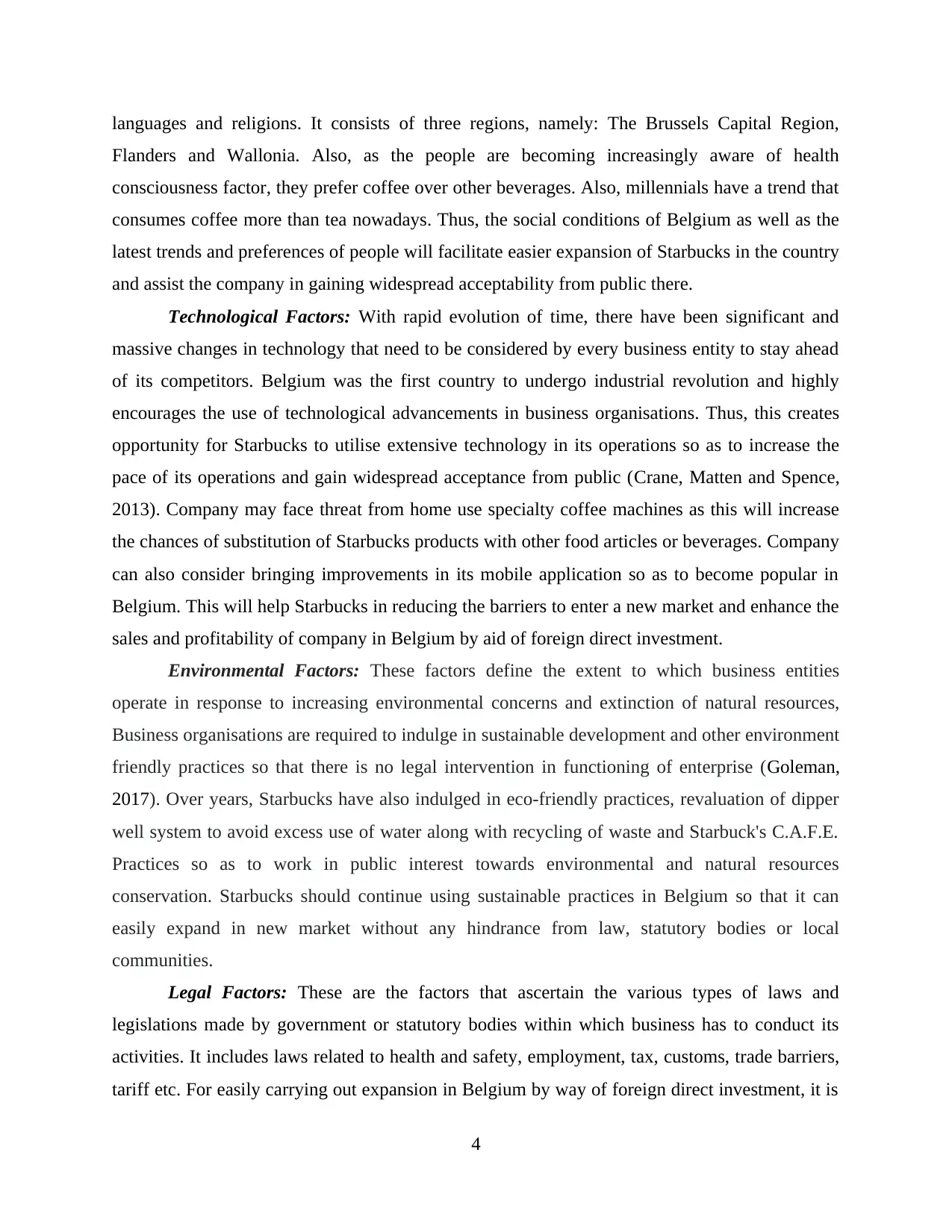
languages and religions. It consists of three regions, namely: The Brussels Capital Region,
Flanders and Wallonia. Also, as the people are becoming increasingly aware of health
consciousness factor, they prefer coffee over other beverages. Also, millennials have a trend that
consumes coffee more than tea nowadays. Thus, the social conditions of Belgium as well as the
latest trends and preferences of people will facilitate easier expansion of Starbucks in the country
and assist the company in gaining widespread acceptability from public there.
Technological Factors: With rapid evolution of time, there have been significant and
massive changes in technology that need to be considered by every business entity to stay ahead
of its competitors. Belgium was the first country to undergo industrial revolution and highly
encourages the use of technological advancements in business organisations. Thus, this creates
opportunity for Starbucks to utilise extensive technology in its operations so as to increase the
pace of its operations and gain widespread acceptance from public (Crane, Matten and Spence,
2013). Company may face threat from home use specialty coffee machines as this will increase
the chances of substitution of Starbucks products with other food articles or beverages. Company
can also consider bringing improvements in its mobile application so as to become popular in
Belgium. This will help Starbucks in reducing the barriers to enter a new market and enhance the
sales and profitability of company in Belgium by aid of foreign direct investment.
Environmental Factors: These factors define the extent to which business entities
operate in response to increasing environmental concerns and extinction of natural resources,
Business organisations are required to indulge in sustainable development and other environment
friendly practices so that there is no legal intervention in functioning of enterprise (Goleman,
2017). Over years, Starbucks have also indulged in eco-friendly practices, revaluation of dipper
well system to avoid excess use of water along with recycling of waste and Starbuck's C.A.F.E.
Practices so as to work in public interest towards environmental and natural resources
conservation. Starbucks should continue using sustainable practices in Belgium so that it can
easily expand in new market without any hindrance from law, statutory bodies or local
communities.
Legal Factors: These are the factors that ascertain the various types of laws and
legislations made by government or statutory bodies within which business has to conduct its
activities. It includes laws related to health and safety, employment, tax, customs, trade barriers,
tariff etc. For easily carrying out expansion in Belgium by way of foreign direct investment, it is
4
Flanders and Wallonia. Also, as the people are becoming increasingly aware of health
consciousness factor, they prefer coffee over other beverages. Also, millennials have a trend that
consumes coffee more than tea nowadays. Thus, the social conditions of Belgium as well as the
latest trends and preferences of people will facilitate easier expansion of Starbucks in the country
and assist the company in gaining widespread acceptability from public there.
Technological Factors: With rapid evolution of time, there have been significant and
massive changes in technology that need to be considered by every business entity to stay ahead
of its competitors. Belgium was the first country to undergo industrial revolution and highly
encourages the use of technological advancements in business organisations. Thus, this creates
opportunity for Starbucks to utilise extensive technology in its operations so as to increase the
pace of its operations and gain widespread acceptance from public (Crane, Matten and Spence,
2013). Company may face threat from home use specialty coffee machines as this will increase
the chances of substitution of Starbucks products with other food articles or beverages. Company
can also consider bringing improvements in its mobile application so as to become popular in
Belgium. This will help Starbucks in reducing the barriers to enter a new market and enhance the
sales and profitability of company in Belgium by aid of foreign direct investment.
Environmental Factors: These factors define the extent to which business entities
operate in response to increasing environmental concerns and extinction of natural resources,
Business organisations are required to indulge in sustainable development and other environment
friendly practices so that there is no legal intervention in functioning of enterprise (Goleman,
2017). Over years, Starbucks have also indulged in eco-friendly practices, revaluation of dipper
well system to avoid excess use of water along with recycling of waste and Starbuck's C.A.F.E.
Practices so as to work in public interest towards environmental and natural resources
conservation. Starbucks should continue using sustainable practices in Belgium so that it can
easily expand in new market without any hindrance from law, statutory bodies or local
communities.
Legal Factors: These are the factors that ascertain the various types of laws and
legislations made by government or statutory bodies within which business has to conduct its
activities. It includes laws related to health and safety, employment, tax, customs, trade barriers,
tariff etc. For easily carrying out expansion in Belgium by way of foreign direct investment, it is
4
⊘ This is a preview!⊘
Do you want full access?
Subscribe today to unlock all pages.

Trusted by 1+ million students worldwide
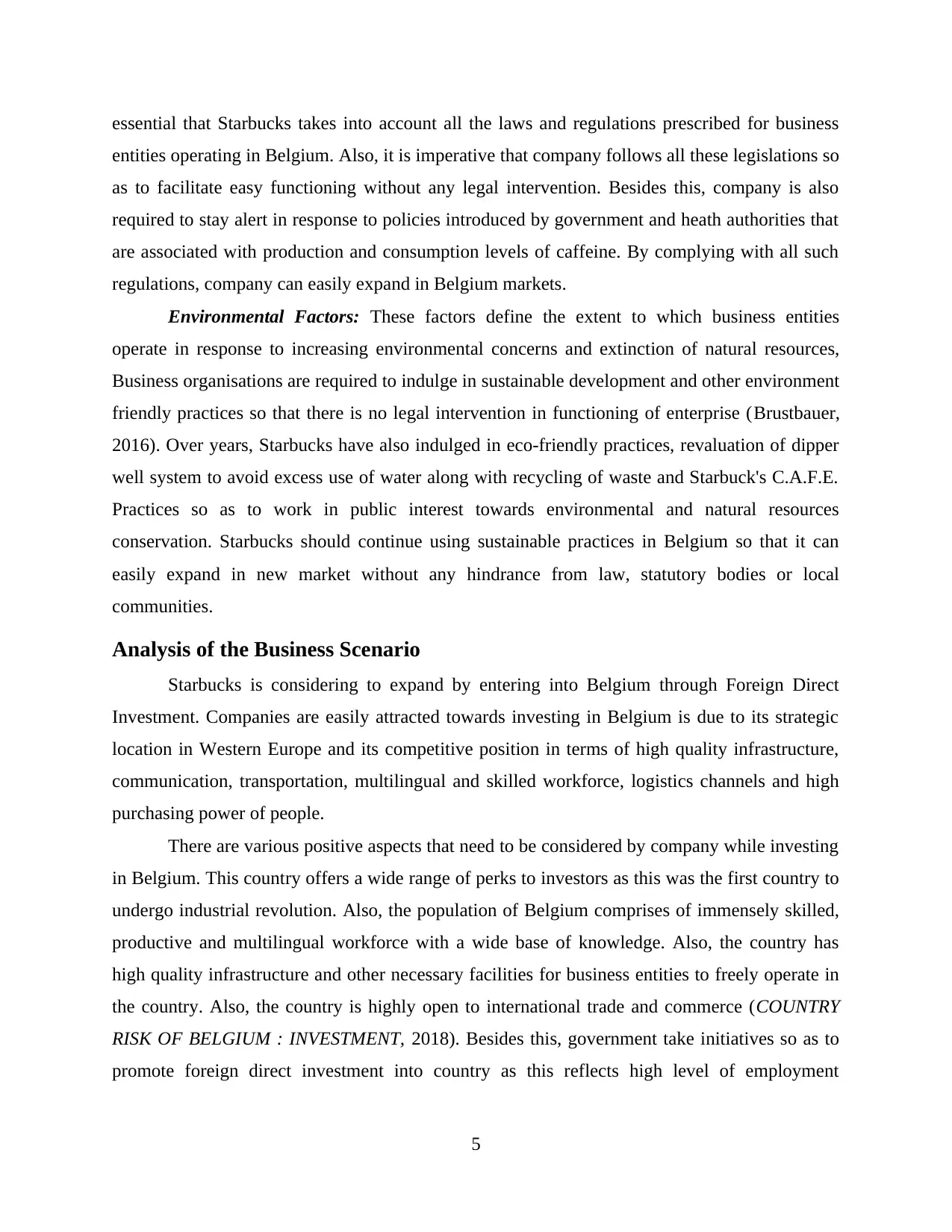
essential that Starbucks takes into account all the laws and regulations prescribed for business
entities operating in Belgium. Also, it is imperative that company follows all these legislations so
as to facilitate easy functioning without any legal intervention. Besides this, company is also
required to stay alert in response to policies introduced by government and heath authorities that
are associated with production and consumption levels of caffeine. By complying with all such
regulations, company can easily expand in Belgium markets.
Environmental Factors: These factors define the extent to which business entities
operate in response to increasing environmental concerns and extinction of natural resources,
Business organisations are required to indulge in sustainable development and other environment
friendly practices so that there is no legal intervention in functioning of enterprise (Brustbauer,
2016). Over years, Starbucks have also indulged in eco-friendly practices, revaluation of dipper
well system to avoid excess use of water along with recycling of waste and Starbuck's C.A.F.E.
Practices so as to work in public interest towards environmental and natural resources
conservation. Starbucks should continue using sustainable practices in Belgium so that it can
easily expand in new market without any hindrance from law, statutory bodies or local
communities.
Analysis of the Business Scenario
Starbucks is considering to expand by entering into Belgium through Foreign Direct
Investment. Companies are easily attracted towards investing in Belgium is due to its strategic
location in Western Europe and its competitive position in terms of high quality infrastructure,
communication, transportation, multilingual and skilled workforce, logistics channels and high
purchasing power of people.
There are various positive aspects that need to be considered by company while investing
in Belgium. This country offers a wide range of perks to investors as this was the first country to
undergo industrial revolution. Also, the population of Belgium comprises of immensely skilled,
productive and multilingual workforce with a wide base of knowledge. Also, the country has
high quality infrastructure and other necessary facilities for business entities to freely operate in
the country. Also, the country is highly open to international trade and commerce (COUNTRY
RISK OF BELGIUM : INVESTMENT, 2018). Besides this, government take initiatives so as to
promote foreign direct investment into country as this reflects high level of employment
5
entities operating in Belgium. Also, it is imperative that company follows all these legislations so
as to facilitate easy functioning without any legal intervention. Besides this, company is also
required to stay alert in response to policies introduced by government and heath authorities that
are associated with production and consumption levels of caffeine. By complying with all such
regulations, company can easily expand in Belgium markets.
Environmental Factors: These factors define the extent to which business entities
operate in response to increasing environmental concerns and extinction of natural resources,
Business organisations are required to indulge in sustainable development and other environment
friendly practices so that there is no legal intervention in functioning of enterprise (Brustbauer,
2016). Over years, Starbucks have also indulged in eco-friendly practices, revaluation of dipper
well system to avoid excess use of water along with recycling of waste and Starbuck's C.A.F.E.
Practices so as to work in public interest towards environmental and natural resources
conservation. Starbucks should continue using sustainable practices in Belgium so that it can
easily expand in new market without any hindrance from law, statutory bodies or local
communities.
Analysis of the Business Scenario
Starbucks is considering to expand by entering into Belgium through Foreign Direct
Investment. Companies are easily attracted towards investing in Belgium is due to its strategic
location in Western Europe and its competitive position in terms of high quality infrastructure,
communication, transportation, multilingual and skilled workforce, logistics channels and high
purchasing power of people.
There are various positive aspects that need to be considered by company while investing
in Belgium. This country offers a wide range of perks to investors as this was the first country to
undergo industrial revolution. Also, the population of Belgium comprises of immensely skilled,
productive and multilingual workforce with a wide base of knowledge. Also, the country has
high quality infrastructure and other necessary facilities for business entities to freely operate in
the country. Also, the country is highly open to international trade and commerce (COUNTRY
RISK OF BELGIUM : INVESTMENT, 2018). Besides this, government take initiatives so as to
promote foreign direct investment into country as this reflects high level of employment
5
Paraphrase This Document
Need a fresh take? Get an instant paraphrase of this document with our AI Paraphraser
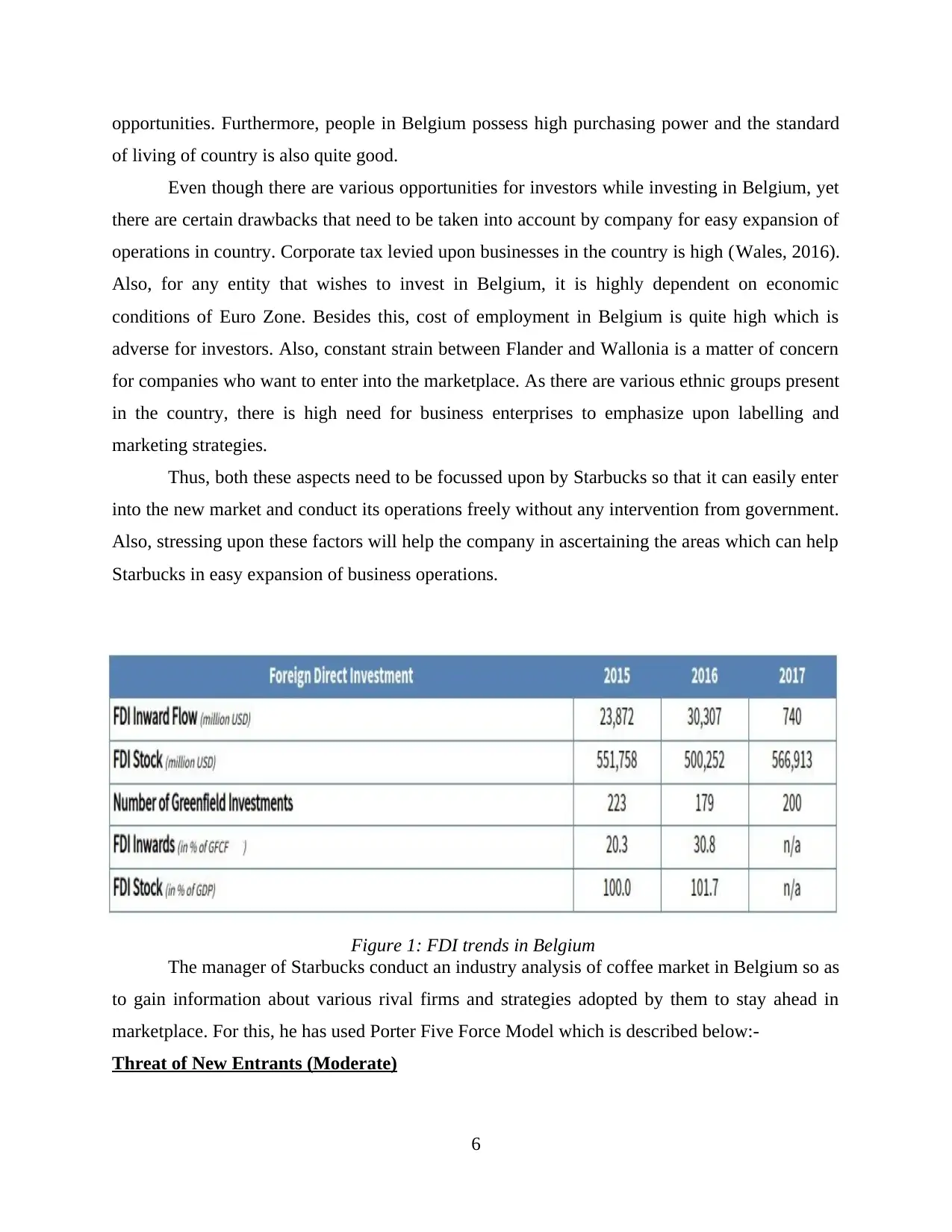
opportunities. Furthermore, people in Belgium possess high purchasing power and the standard
of living of country is also quite good.
Even though there are various opportunities for investors while investing in Belgium, yet
there are certain drawbacks that need to be taken into account by company for easy expansion of
operations in country. Corporate tax levied upon businesses in the country is high (Wales, 2016).
Also, for any entity that wishes to invest in Belgium, it is highly dependent on economic
conditions of Euro Zone. Besides this, cost of employment in Belgium is quite high which is
adverse for investors. Also, constant strain between Flander and Wallonia is a matter of concern
for companies who want to enter into the marketplace. As there are various ethnic groups present
in the country, there is high need for business enterprises to emphasize upon labelling and
marketing strategies.
Thus, both these aspects need to be focussed upon by Starbucks so that it can easily enter
into the new market and conduct its operations freely without any intervention from government.
Also, stressing upon these factors will help the company in ascertaining the areas which can help
Starbucks in easy expansion of business operations.
The manager of Starbucks conduct an industry analysis of coffee market in Belgium so as
to gain information about various rival firms and strategies adopted by them to stay ahead in
marketplace. For this, he has used Porter Five Force Model which is described below:-
Threat of New Entrants (Moderate)
6
Figure 1: FDI trends in Belgium
of living of country is also quite good.
Even though there are various opportunities for investors while investing in Belgium, yet
there are certain drawbacks that need to be taken into account by company for easy expansion of
operations in country. Corporate tax levied upon businesses in the country is high (Wales, 2016).
Also, for any entity that wishes to invest in Belgium, it is highly dependent on economic
conditions of Euro Zone. Besides this, cost of employment in Belgium is quite high which is
adverse for investors. Also, constant strain between Flander and Wallonia is a matter of concern
for companies who want to enter into the marketplace. As there are various ethnic groups present
in the country, there is high need for business enterprises to emphasize upon labelling and
marketing strategies.
Thus, both these aspects need to be focussed upon by Starbucks so that it can easily enter
into the new market and conduct its operations freely without any intervention from government.
Also, stressing upon these factors will help the company in ascertaining the areas which can help
Starbucks in easy expansion of business operations.
The manager of Starbucks conduct an industry analysis of coffee market in Belgium so as
to gain information about various rival firms and strategies adopted by them to stay ahead in
marketplace. For this, he has used Porter Five Force Model which is described below:-
Threat of New Entrants (Moderate)
6
Figure 1: FDI trends in Belgium
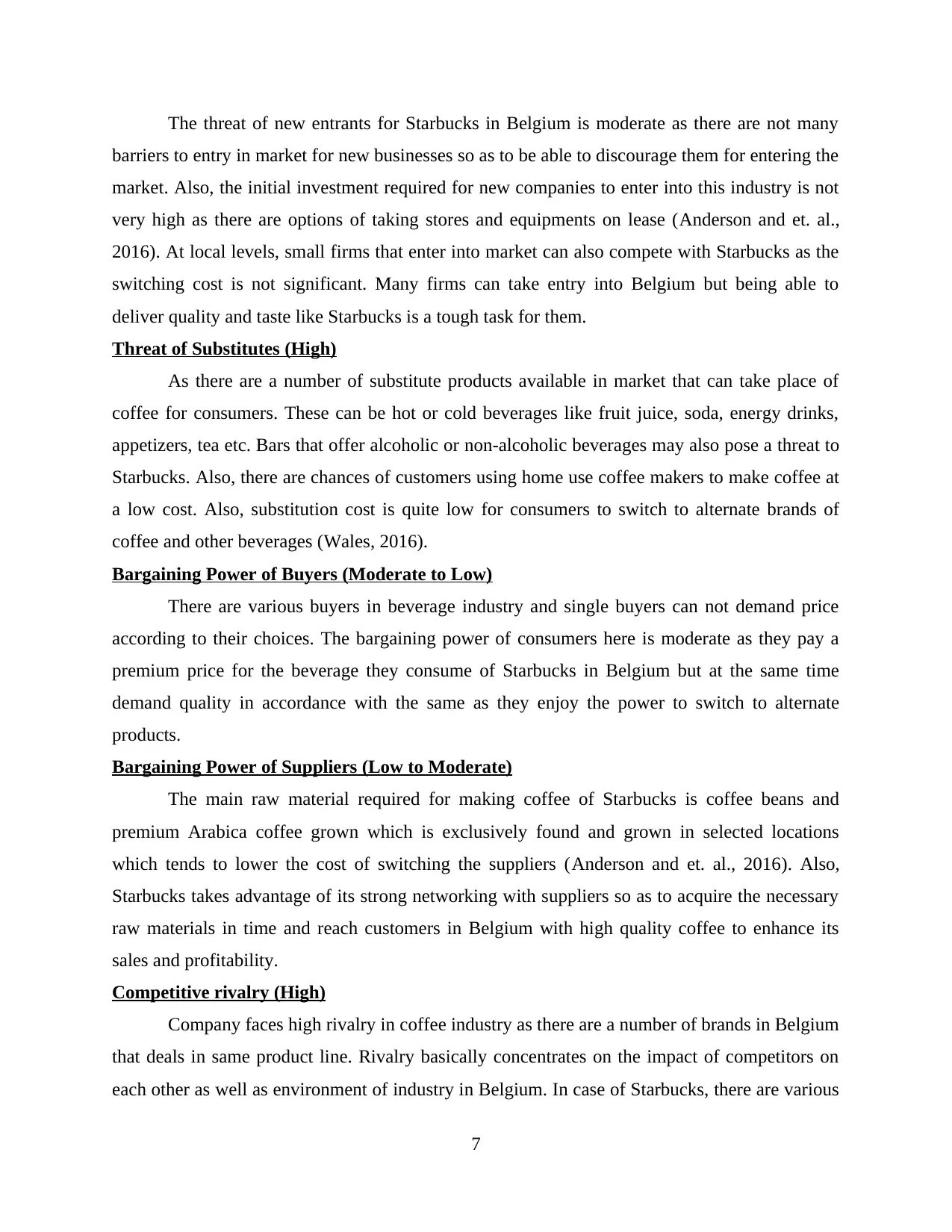
The threat of new entrants for Starbucks in Belgium is moderate as there are not many
barriers to entry in market for new businesses so as to be able to discourage them for entering the
market. Also, the initial investment required for new companies to enter into this industry is not
very high as there are options of taking stores and equipments on lease (Anderson and et. al.,
2016). At local levels, small firms that enter into market can also compete with Starbucks as the
switching cost is not significant. Many firms can take entry into Belgium but being able to
deliver quality and taste like Starbucks is a tough task for them.
Threat of Substitutes (High)
As there are a number of substitute products available in market that can take place of
coffee for consumers. These can be hot or cold beverages like fruit juice, soda, energy drinks,
appetizers, tea etc. Bars that offer alcoholic or non-alcoholic beverages may also pose a threat to
Starbucks. Also, there are chances of customers using home use coffee makers to make coffee at
a low cost. Also, substitution cost is quite low for consumers to switch to alternate brands of
coffee and other beverages (Wales, 2016).
Bargaining Power of Buyers (Moderate to Low)
There are various buyers in beverage industry and single buyers can not demand price
according to their choices. The bargaining power of consumers here is moderate as they pay a
premium price for the beverage they consume of Starbucks in Belgium but at the same time
demand quality in accordance with the same as they enjoy the power to switch to alternate
products.
Bargaining Power of Suppliers (Low to Moderate)
The main raw material required for making coffee of Starbucks is coffee beans and
premium Arabica coffee grown which is exclusively found and grown in selected locations
which tends to lower the cost of switching the suppliers (Anderson and et. al., 2016). Also,
Starbucks takes advantage of its strong networking with suppliers so as to acquire the necessary
raw materials in time and reach customers in Belgium with high quality coffee to enhance its
sales and profitability.
Competitive rivalry (High)
Company faces high rivalry in coffee industry as there are a number of brands in Belgium
that deals in same product line. Rivalry basically concentrates on the impact of competitors on
each other as well as environment of industry in Belgium. In case of Starbucks, there are various
7
barriers to entry in market for new businesses so as to be able to discourage them for entering the
market. Also, the initial investment required for new companies to enter into this industry is not
very high as there are options of taking stores and equipments on lease (Anderson and et. al.,
2016). At local levels, small firms that enter into market can also compete with Starbucks as the
switching cost is not significant. Many firms can take entry into Belgium but being able to
deliver quality and taste like Starbucks is a tough task for them.
Threat of Substitutes (High)
As there are a number of substitute products available in market that can take place of
coffee for consumers. These can be hot or cold beverages like fruit juice, soda, energy drinks,
appetizers, tea etc. Bars that offer alcoholic or non-alcoholic beverages may also pose a threat to
Starbucks. Also, there are chances of customers using home use coffee makers to make coffee at
a low cost. Also, substitution cost is quite low for consumers to switch to alternate brands of
coffee and other beverages (Wales, 2016).
Bargaining Power of Buyers (Moderate to Low)
There are various buyers in beverage industry and single buyers can not demand price
according to their choices. The bargaining power of consumers here is moderate as they pay a
premium price for the beverage they consume of Starbucks in Belgium but at the same time
demand quality in accordance with the same as they enjoy the power to switch to alternate
products.
Bargaining Power of Suppliers (Low to Moderate)
The main raw material required for making coffee of Starbucks is coffee beans and
premium Arabica coffee grown which is exclusively found and grown in selected locations
which tends to lower the cost of switching the suppliers (Anderson and et. al., 2016). Also,
Starbucks takes advantage of its strong networking with suppliers so as to acquire the necessary
raw materials in time and reach customers in Belgium with high quality coffee to enhance its
sales and profitability.
Competitive rivalry (High)
Company faces high rivalry in coffee industry as there are a number of brands in Belgium
that deals in same product line. Rivalry basically concentrates on the impact of competitors on
each other as well as environment of industry in Belgium. In case of Starbucks, there are various
7
⊘ This is a preview!⊘
Do you want full access?
Subscribe today to unlock all pages.

Trusted by 1+ million students worldwide
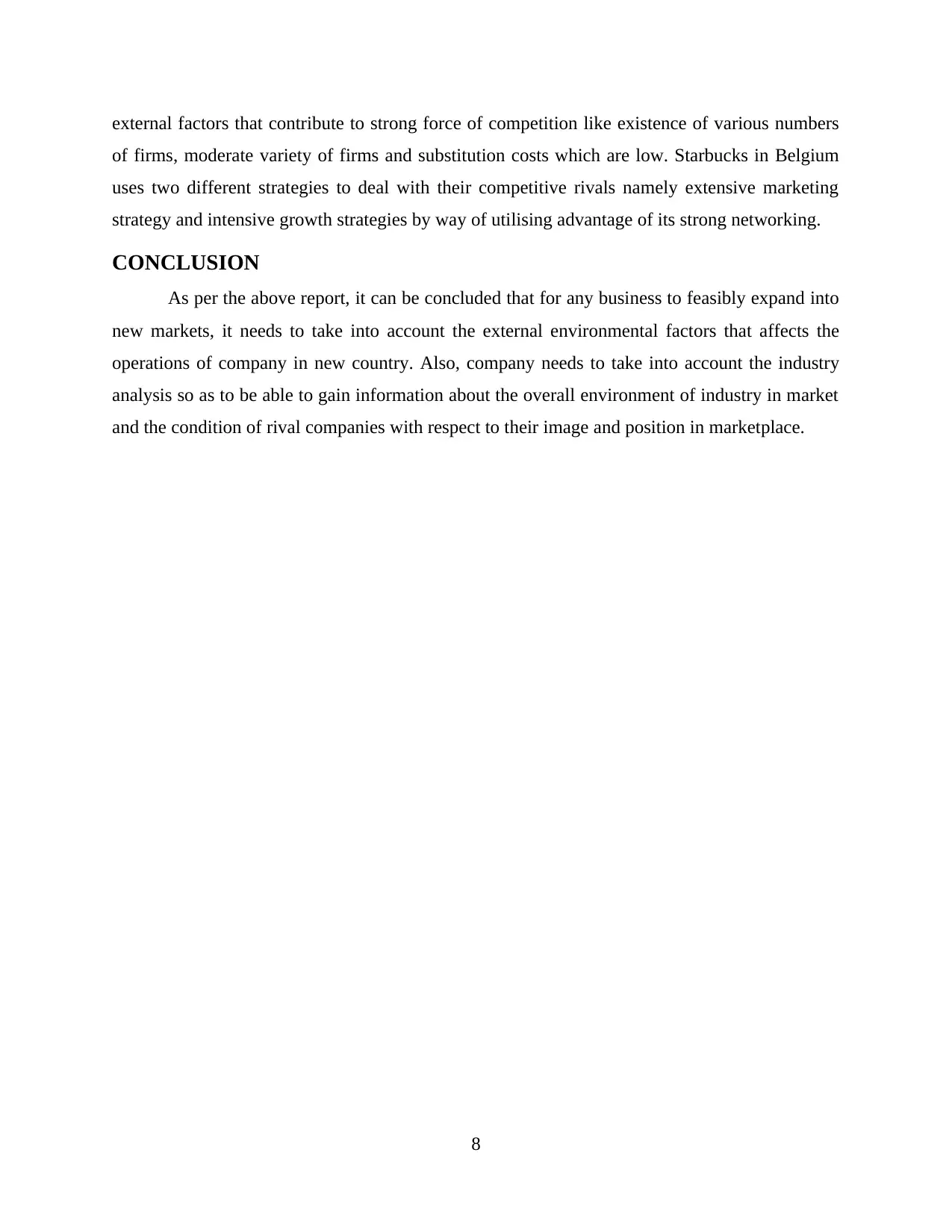
external factors that contribute to strong force of competition like existence of various numbers
of firms, moderate variety of firms and substitution costs which are low. Starbucks in Belgium
uses two different strategies to deal with their competitive rivals namely extensive marketing
strategy and intensive growth strategies by way of utilising advantage of its strong networking.
CONCLUSION
As per the above report, it can be concluded that for any business to feasibly expand into
new markets, it needs to take into account the external environmental factors that affects the
operations of company in new country. Also, company needs to take into account the industry
analysis so as to be able to gain information about the overall environment of industry in market
and the condition of rival companies with respect to their image and position in marketplace.
8
of firms, moderate variety of firms and substitution costs which are low. Starbucks in Belgium
uses two different strategies to deal with their competitive rivals namely extensive marketing
strategy and intensive growth strategies by way of utilising advantage of its strong networking.
CONCLUSION
As per the above report, it can be concluded that for any business to feasibly expand into
new markets, it needs to take into account the external environmental factors that affects the
operations of company in new country. Also, company needs to take into account the industry
analysis so as to be able to gain information about the overall environment of industry in market
and the condition of rival companies with respect to their image and position in marketplace.
8
Paraphrase This Document
Need a fresh take? Get an instant paraphrase of this document with our AI Paraphraser

9
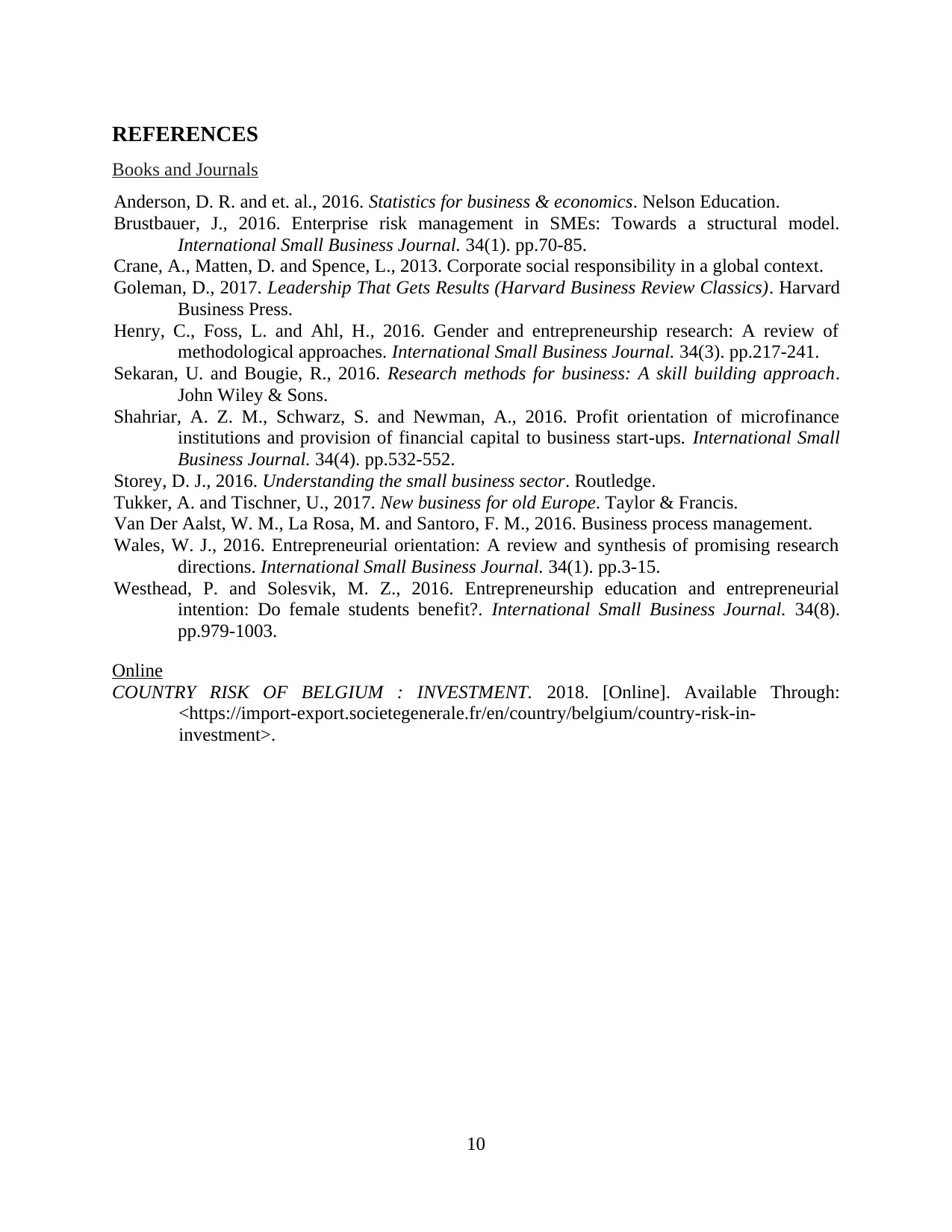
REFERENCES
Books and Journals
Anderson, D. R. and et. al., 2016. Statistics for business & economics. Nelson Education.
Brustbauer, J., 2016. Enterprise risk management in SMEs: Towards a structural model.
International Small Business Journal. 34(1). pp.70-85.
Crane, A., Matten, D. and Spence, L., 2013. Corporate social responsibility in a global context.
Goleman, D., 2017. Leadership That Gets Results (Harvard Business Review Classics). Harvard
Business Press.
Henry, C., Foss, L. and Ahl, H., 2016. Gender and entrepreneurship research: A review of
methodological approaches. International Small Business Journal. 34(3). pp.217-241.
Sekaran, U. and Bougie, R., 2016. Research methods for business: A skill building approach.
John Wiley & Sons.
Shahriar, A. Z. M., Schwarz, S. and Newman, A., 2016. Profit orientation of microfinance
institutions and provision of financial capital to business start-ups. International Small
Business Journal. 34(4). pp.532-552.
Storey, D. J., 2016. Understanding the small business sector. Routledge.
Tukker, A. and Tischner, U., 2017. New business for old Europe. Taylor & Francis.
Van Der Aalst, W. M., La Rosa, M. and Santoro, F. M., 2016. Business process management.
Wales, W. J., 2016. Entrepreneurial orientation: A review and synthesis of promising research
directions. International Small Business Journal. 34(1). pp.3-15.
Westhead, P. and Solesvik, M. Z., 2016. Entrepreneurship education and entrepreneurial
intention: Do female students benefit?. International Small Business Journal. 34(8).
pp.979-1003.
Online
COUNTRY RISK OF BELGIUM : INVESTMENT. 2018. [Online]. Available Through:
<https://import-export.societegenerale.fr/en/country/belgium/country-risk-in-
investment>.
10
Books and Journals
Anderson, D. R. and et. al., 2016. Statistics for business & economics. Nelson Education.
Brustbauer, J., 2016. Enterprise risk management in SMEs: Towards a structural model.
International Small Business Journal. 34(1). pp.70-85.
Crane, A., Matten, D. and Spence, L., 2013. Corporate social responsibility in a global context.
Goleman, D., 2017. Leadership That Gets Results (Harvard Business Review Classics). Harvard
Business Press.
Henry, C., Foss, L. and Ahl, H., 2016. Gender and entrepreneurship research: A review of
methodological approaches. International Small Business Journal. 34(3). pp.217-241.
Sekaran, U. and Bougie, R., 2016. Research methods for business: A skill building approach.
John Wiley & Sons.
Shahriar, A. Z. M., Schwarz, S. and Newman, A., 2016. Profit orientation of microfinance
institutions and provision of financial capital to business start-ups. International Small
Business Journal. 34(4). pp.532-552.
Storey, D. J., 2016. Understanding the small business sector. Routledge.
Tukker, A. and Tischner, U., 2017. New business for old Europe. Taylor & Francis.
Van Der Aalst, W. M., La Rosa, M. and Santoro, F. M., 2016. Business process management.
Wales, W. J., 2016. Entrepreneurial orientation: A review and synthesis of promising research
directions. International Small Business Journal. 34(1). pp.3-15.
Westhead, P. and Solesvik, M. Z., 2016. Entrepreneurship education and entrepreneurial
intention: Do female students benefit?. International Small Business Journal. 34(8).
pp.979-1003.
Online
COUNTRY RISK OF BELGIUM : INVESTMENT. 2018. [Online]. Available Through:
<https://import-export.societegenerale.fr/en/country/belgium/country-risk-in-
investment>.
10
⊘ This is a preview!⊘
Do you want full access?
Subscribe today to unlock all pages.

Trusted by 1+ million students worldwide
1 out of 12
Related Documents
Your All-in-One AI-Powered Toolkit for Academic Success.
+13062052269
info@desklib.com
Available 24*7 on WhatsApp / Email
![[object Object]](/_next/static/media/star-bottom.7253800d.svg)
Unlock your academic potential
Copyright © 2020–2026 A2Z Services. All Rights Reserved. Developed and managed by ZUCOL.





